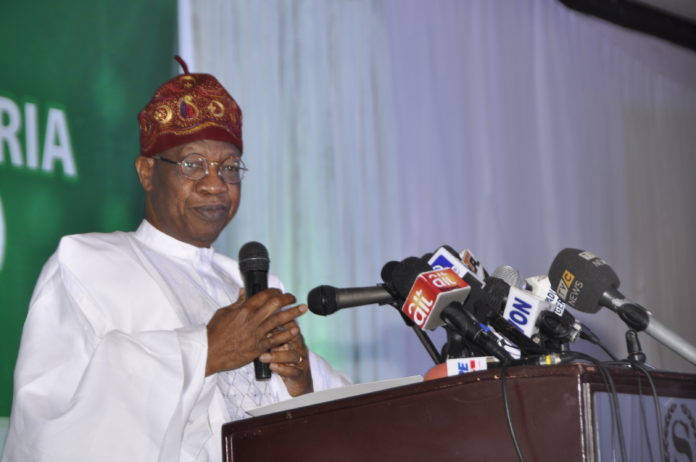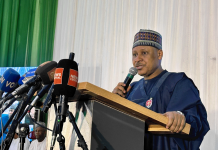Speech by the Minister of Information and Culture, Alhaji Lai Mohammed, at the Annual National Conference and General Meeting of the NIPR in Ilorin, Kwara State, on Thursday, 27 April 2017
PROTOCOL
I am most honoured to be here today to attend the annual national conference and general meeting of the Nigerian Institute of Public Relations (NIPR). Let me say that my presence here today is a measure of the importance I attach to this conference. Due to competing assignments and tough logistics, I virtually had to jump through hoops to be here. Without equivocating, however, I will say that I am glad to be among you all.
2. There is no better occasion that this to examine the increasingly tough, and almost impossible, job of a public relations practitioner. Tougher still is the task of the Government Perception Manager, whether he or she is the Minister of Information, Commissioner for Information, Spokespersons for the President or Governor or for any government agency.
3. The challenges faced daily by the perception managers have been exacerbated by the Social Media. Today, the challenges have defied everything the practitioner may have been taught about perception management, public relations and all. Therefore, the government spokesperson, in order to succeed, must be a Cicero, a Socrates, an Albert Einstein and a Machiavelli all rolled into one.
4. The perception manager today is engaged in an unending war with an opposition that is amorphously defined, an opposition who never sleeps, an opposition that has no rules of engagement, an opposition that has power without responsibility or control, one whose objective is not to inform, educate or provide constructive criticism but to set their own agenda from their own ethnic, religious, ideological and economic perspective, irrespective of what the challenges of government are.
5. Today’s perception manager, especially at the government level, can be likened to one who has signed a contract, the terms of which he or she is not aware of. As I said earlier, the opponents are not clearly defined. They could be friends today and opponents tomorrow. They are not interested in the vision of the government nor the welfare of the people. They insist on being heard and seen, and the privacy, reputation or integrity of the public official are of no consequence to them. As far as they are concerned, government and its leadership must be annihilated. It is not about logic, reason, intellectual discourse or professionalism. It is about viciousness and bitterness that are hard to fathom.
6. Today, anyone with a phone and data is a journalist, a blogger, owner of an online publication, an opinion molder, etc. They invent stories and even spend money to push such phantom stories. Their mantra is to lie, misinform, malign and confuse. And they do all this simply because they can. No regulations, no sanctions. The spokesperson is at their mercy. Regrettably, they have a fanatic followership in the largely uninformed masses, whose experience over the years has primed them not to trust government and public office holders.
7. The masses are daily served incredible menu and unbelievable tales which they swallow hook, line and sinker. How else can you explain that people will believe and circulate a fake report that the
Minister of Information and Culture, that is yours truly, has 1.2 billion dollars in his imaginary bank account? Let’s examine this for a moment. 1.2 billion dollars is about 400 billion Naira. The entire yearly budget of the Ministry of Information and Culture, where I preside, is under 15 billion Naira, and these include salaries, overhead and capital projects. Assuming, without conceding, that the Minister somehow manages to transfer the entire budget into his personal account, it will take 25 years for him to amass 400 billion Naira. Yet, this disinformation was lapped up by the public. Similar imaginary huge sums of money have been credited to other Ministers.
8. This is not a surprise, because the more vicious and irreverent a blog or website is, the more the followership. The more the naysayers can invent stories or malign government officials, the more their ratings. They do not wait for the weekly Federal Executive Council to end before they put out their version of what transpired there. Only yesterday, even after I had briefed the State House Correspondents on the outcome of the day’s meeting, my views were still misrepresented.
I had said President Muhammadu Buhari chose to rest and work from home for that day, hence he has asked the VP to preside over the day’s FEC meeting. By the time this was reported, a section of the press simply quoted me as saying the President will henceforth be working from home. Even when they are corrected, they are neither sorry nor remorseful. They just move on, to do something worse the day after!
9. One may be tempted to ask: Why do these naysayers do what they do? It is partly to distract government, to force the government perception spokespersons to be fighting bush fires and then lose focus. It is therefore imperative for government perception managers to be keenly aware of this, so as not to fall prey.
10. As spokespersons for the government, you must not allow yourselves to be distracted. You must be proactive rather than defensive. You must refuse to allow them to set your agenda for you.
You must not allow them to turn you to a fire brigade, fighting bush fires all over. You must stay true to your calling to inform and educate, and to telegraph the achievements of your principal and the intentions of government. You must neither be intimidated, cowed nor be overwhelmed by the cynics. You must set your own agenda and daily review such, with a view to improving on them. You must never lose touch with your traditional constituents. You must understand the tactics of the opposition, which is ambush and irrational.
11. For example, when we inform them of the rot we met in government and the unimaginable body blows that the economy has endured, blows that would have shaken even the strongest economy in the world, they shrug it away, saying cynically ‘we know that, and that’s why we voted you into office’. When we tell them how we created 200,000 jobs in one fell swoop, they pretend not to hear. When we inform that our gallant military has captured Ground Zero of the Sambisa Forest, they are not interested. When 21 Chibok Girls were released, they say it’s a lie.
When our Euro-bond was oversubscribed eight times over, they do not consider that news good enough. When we recorded a month-on-month reduction in inflation, they sneer at us. When we said we have saved over 9 billion Naira from travels and estacodes in one year, they feign ignorance and when we said the government is taking unprecedented steps to fight corruption, they accuse us of being selective.
12. The government information managers must not allow themselves to be discouraged by this. They must continue to trumpet the achievements of their governments and the challenges they face in delivering the dividends of democracy to the people, because this is their role, to inform, educate and to polish the image of government.
13. Today’s government information manager, whether he is Minister or Commissioner in charge of Information, must equip himself with qualities such as integrity, courage, abnormal capacity for hard work, ingenuity, resourcefulness, ability to think out of the box, encyclopedic knowledge of all things under the stars, incorruptibility and, above all, passion about the job.
Tough times require tough people, and tough challenges require hard work. In the end, success is guaranteed, irrespective of the antics of the naysayers.
14. I wish you a successful deliberation, and I thank you for your kind attention.






